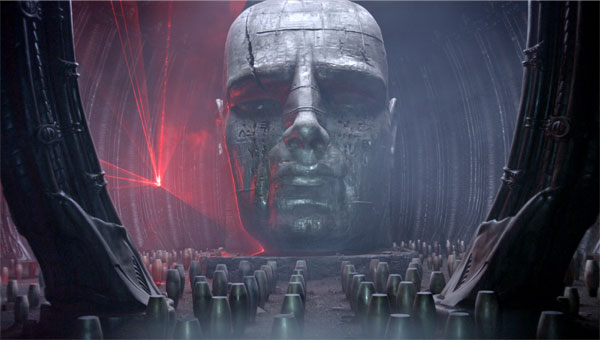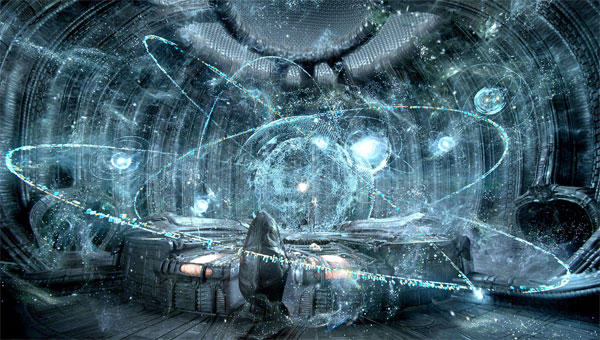Prometheus Review

Do you know where you’re coming from?
Dr’s Elizabeth Shaw and Charlie Holloway don’t, but they sure would like to.
So when they discover the same drawing of the stars in a veritable smorgasbord of prehistoric caves and dwellings spanning different ages and cultures throughout human history, they’re convinced it can mean only one thing.
The image is a star map, but much more than that too; it’s an invitation from our creators to come and meet them.
If only there was some crackpot multi billionaire near death who’s willing to fund such an expedition to the stars to discover the origin of our species.
Luckily enough for the premise of Prometheus, there is. Otherwise Ridley Scott’s new movie would have painted itself into one a hell of a box.
So our intrepid explorers head off to the stars, accompanied by a familiar rag tag collection of androids, captains, geologists and alien fodder that typically make up a crew of any sci-fi flick, to keep their date with destiny.
But when they reach their destination, will they like the answers they find?
Prometheus is the epic new film from iconic director Ridley Scott, borne from the mythology of the particular sci-fi reality he created in his original Alien film over thirty years ago.
That little, four letter word “epic” is overused to describe a lot of things in this hyper exaggerated age we live in, but in the case of Prometheus, I’m not sure it does Scott’s new film justice.
From the immense opening sequence that offers an alternative explanation to the origin of our species, to the big budget spaceship scenes which dance across London’s premier IMAX screen in glorious 3D, Prometheus delivers unto us mere mortals the fire of a mind bending cinematic experience.

Of course, all substance and too little style is no recipe for the gods I have in mind, and so it is with John Spaihts and Damon Lindelof’s script.
Marrying the insanely egotistical assumptions humans like to have about our race, i.e. we’re so god damned special a supreme being must have created us, with the science fiction lore of Scott’s previous Alien film, Prometheus’ story burns just as brightly as the special effects.
Don’t worry if you haven’t seen the original though, whilst it no doubt offers the perfect foundation for a better insight into this new film, it is by no means a pre-requisite as Prometheus stands upright on its own merits.
The ensemble cast is also uniformly great in their respective roles. Rapace as the intrepid yet fragile explorer Shaw is the bleeding heart of Scott’s movie, with her almost alien features and childlike innocence a beguiling combination on the big screen.
Michael Fassbender is quite brilliant as David, the android who would be a man if only he had a soul. Such is the Irish actor’s sustained excellence in every role I’ve ever seen watched, I now take this as standard with the man.
Pretty soon, a Fassbender performance will only be noteworthy if isn’t up to his own high standards. In fact, we may already be there.
The other star names are cast in familiar sci-fi fashion, so we have Charlize Theron playing the hard as nails and uncompassionate commander Meredith Vickers, Idris Elba as the blue collar captain Janek who’s duty is to fly the ship and push people’s buttons along the way, and Logan Marshall-Green as the devil may care idealist who throws scientific caution to the wind as soon as he steps onto their new world.
Of course, this wouldn’t be a science fiction flick if there weren’t a good number of expendable human characters to serve as ideal alien fodder should anything go wrong on their mission.
As you know it will.
By Prometheus’ climax, you can’t help but feel the story has slightly lost its way. The infinite possibilities of a meeting with our potential creators offers too much scope, with the conclusion proving to be less definitive than I was hoping for.
Considering the question in hand though, an enigmatic answer was pretty inevitable; and the sheer spectacle of Prometheus more than makes up for this.
So I may still not know where I’m coming from exactly, but maybe that’s not such a bad thing after all.
Jonathan Campbell